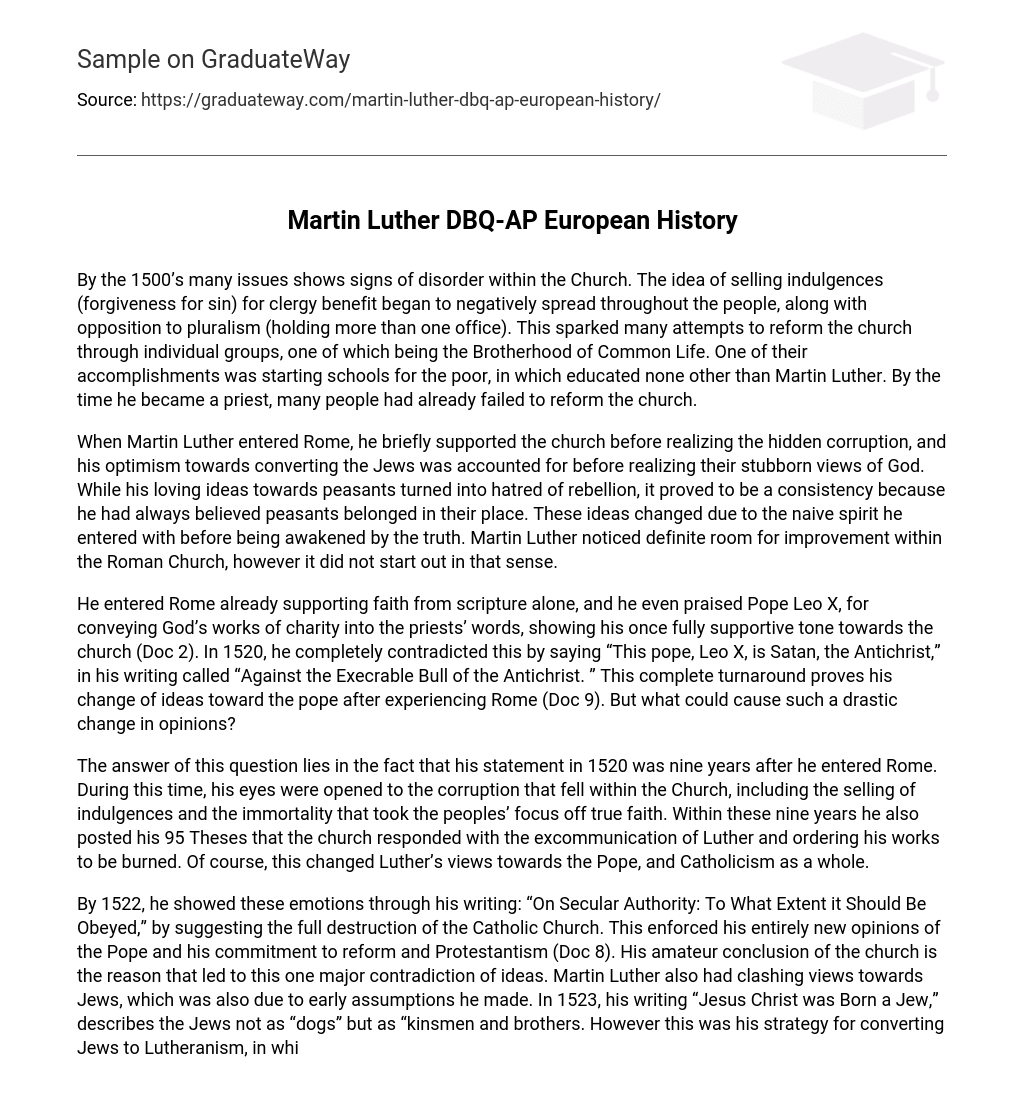During the 1500’s, disorder began to emerge within the Church due to various problems. The sale of indulgences, which allowed clergy to benefit from forgiveness for sin, started gaining popularity and faced opposition towards holding multiple offices (pluralism). In response, several groups attempted individual church reforms, such as the Brotherhood of Common Life. They established schools for the underprivileged, where Martin Luther received his education. However, by the time Luther became a priest, previous attempts at church reform had not been successful.
When Martin Luther arrived in Rome, he initially backed the church, but then uncovered its hidden corruption. He also had hopeful beliefs about converting Jews, until he realized they held steadfast views about God. Similarly, his affectionate notions towards peasants transformed into disdain for rebellion, aligning with his long-held belief that peasants should know their place. These ideas underwent transformation as Martin Luther’s naive mindset was awakened to the truth. Although he recognized significant areas for improvement within the Roman Church, it did not begin with such implications.
Despite initially believing in the authority of scripture alone and praising Pope Leo X for incorporating God’s acts of charity into the words of the priests, he underwent a complete contradiction in 1520. In his work titled “Against the Execrable Bull of the Antichrist,” he referred to Pope Leo X as “Satan, the Antichrist.” This radical shift demonstrates his changed views towards the Pope after his time in Rome. The cause of such a dramatic transformation of opinions remains unclear.
The reason for this question’s answer is that in 1520, nine years after he arrived in Rome, Martin Luther became aware of the corruption within the Church. This corruption included the sale of indulgences and the distraction of the people from true faith by immorality. In these nine years, he also posted his 95 Theses which led to his excommunication by the church and the ordering of his works to be burned. Needless to say, this altered Luther’s perspective on the Pope and Catholicism as a whole.
By 1522, Martin Luther expressed his frustrations with the Catholic Church and called for its complete destruction in his work “On Secular Authority: To What Extent it Should Be Obeyed” (Doc 8). This showcased his new beliefs and commitment to Protestantism and reform. However, Luther’s initial conclusions about the church led to contradictions in his ideas. Similarly, Luther had conflicting views towards Jews based on early assumptions. In his writing “Jesus Christ was Born a Jew” in 1523, Luther referred to Jews not as “dogs” but as “kinsmen and brothers” in an attempt to convert them to Lutheranism (Doc 1). However, he later recognized his failure in persuading them and subsequently developed hostility towards Jews. In 1543, Luther wrote “On the Jews and Their Lies,” completely transforming his previous positive views of Jews.
According to Doc 4, he attributed their excessive lying to their anger towards his failed attempts to convert them. These contradicting claims can be attributed to Martin Luther’s naive assumptions that he could not sustain throughout his entire Protestant Reformation. Despite the contradictions, Martin Luther had a few consistent ideas, such as Sola Scriptura and consubstantiation. However, there were also misleading topics disguised as inconsistencies, particularly in his views towards peasants.
Despite his own humble origins, Luther initially supported the peasant cause and expressed solidarity with them in his letter to the Prince in 1519. However, he did not provide any specific solutions or support for their demands, indicating that he believed they should remain in their societal position despite sympathizing with their grievances. This shows that while Luther fought against the Pope for similar reasons as the peasants and stood up for his people, he still maintained a perspective that they should not disrupt the existing social order (Doc6).
Hence, Luther’s anger towards the Peasant Rebellion was justified. It aligns with his belief that people should not challenge authority, as long as they remain in their oppressed state. As a result, his harsh response in “Against the Murderous, Thieving Hordes of Peasants” can be seen as understandable.
Martin Luther demanded action against those who lost his trust and the trust of authority because they did not change his mind but betrayed his trust (Doc 3). Additionally, Luther consistently advocated for the order of the state over the church, as seen in his warning to Christians, which supports his lifelong consistencies (Doc 12). Although Luther contradicted himself multiple times during his reform efforts, he maintained some of his ideas. However, his assumptions about the Pope were altered due to premature conclusions.
Martin Luther experienced a shift in his attitudes towards Jews after realizing that his efforts to convert them were ineffective, resulting in backlash when he was unsuccessful. Nevertheless, he consistently endorsed the oppression of his fellow peasants, leading him to oppose their rebellion. However, he unwaveringly believed in the authority of the state over the church. Ultimately, Luther maintained firm convictions, although some changed due to his early and naive assumptions. Despite this, Luther’s impact on religious reform in 16th century Europe was substantial.





